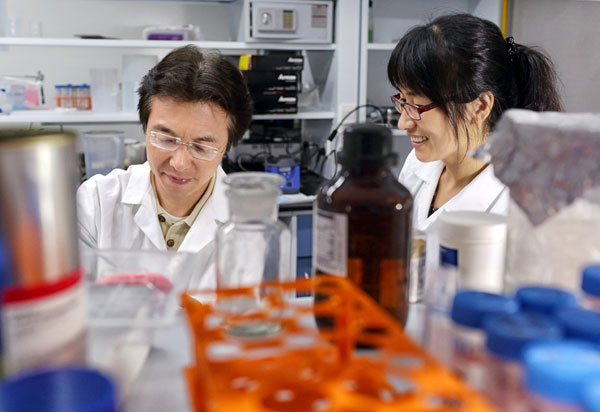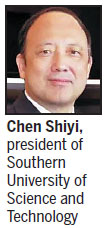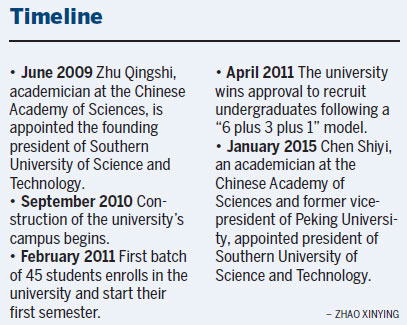Science, tech school jostles for top position
By Zhao Xinying (China Daily) Updated: 2016-04-05 08:11
 |
|
Zhu Baoting (left), a leading professor in biology from Southern University of Science and Technology, guides a student in a lab last year. [Photo provided to China Daily] |
Institution wants to become 'China's Stanford', help develop nation's version of Silicon Valley
As a pilot for China's higher education reform, Southern University of Science and Technology is aiming for the top, according to its president.
The public university has positioned itself as a nurturer of innovation and talent since winning approval from the Ministry of Education in April 2012 to be established in Shenzhen, a rising hub of high-technology and innovation in South China's Guangdong province.
Chen Shiyi, its president, said the university aimed to attract both excellent teachers and brilliant students, "and we have been in a leading position in both aspects".
"In 2016, we plan to take on students both from home and abroad to make the university a global one," Chen said, adding that a preliminary plan is to recruit a maximum of 1,000 domestic students and 200 international ones.
According to Chen, among the 200 teachers now working at this young university, five are academicians of the Chinese Academy of Sciences and the Chinese Academy of Engineering and about 30 are scholars from overseas who came under the "1,000 Talents Plan", or the Recruitment Program of Global Experts, which was initiated by the Chinese government to attract scientists and innovators worldwide.
'China's Stanford'
In Chen's eyes, Shenzhen, thought of by many people across the world as China's Silicon Valley, is among the best cities for innovation and entrepreneurship in China.
"We want to support and contribute to the development of the city by building our university into China's Stanford University," he said.
"We want to develop more leading technologies and help Shenzhen create more high-tech enterprises, just like what is happening at Silicon Valley in the United States: professors as well as students at Stanford start their own businesses, among which some have become tycoons like Yahoo! and HP."
To help reach that goal, the university stipulated in its charter that professors should spend at least one day a week consulting or helping the entrepreneurial efforts of companies in Shenzhen.
"We encourage professors to start their own businesses. We also respect their intellectual property rights by allocating 70 percent of the profits to the professors. Our professors are becoming more passionate about entrepreneurship because they are getting rich," Chen said.
According to Chen, a college for innovation and entrepreneurship will be set up this year at the university. This will feature professors lecturing on entrepreneurial theories, successful entrepreneurs sharing experiences and centers for students' entrepreneurial practices.
"You can't imagine how excited our students are about entrepreneurship and about the coming college."
Reformed recruitment
In contrast to most other Chinese universities that evaluate potential students only on the basis of gaokao, or the national entrance exams, Chen said his university adopts a "6 plus 3 plus 1" model.

This means that undergraduates will be recruited based on 60 percent of their gaokao results, 30 percent of the results students get in exams organized by the university itself and 10 percent on their performances in interviews and other aspects.
"We believe this is an all-around and more reasonable way of evaluating students," he said. "Through this model, we have successfully selected students who are hardworking and have strong virtues and personalities."
After the students are enrolled, they can choose to study following a "2 plus 2" model, which allows them to study beyond the restriction of disciplines for the first two years of college life to locate their interest. Then, they can study under a chosen major for the final two years.
In 2011, the university welcomed its first batch of 45 students. The number enrolled increased greatly in the following four years. Last year, the university welcomed the arrival of a total of 935 freshmen.
"We will not expand the number to a very large scale in order to maintain the quality of education," he said.
Last year, the university's first batch of students graduated with bachelor's degrees and 23 of them went to prestigious universities overseas to continue study.

- Silicon Valley lends a hand
- Uber CEO: China to surpass Silicon Valley in innovation
- More electric car R&D in Silicon Valley
- Jiangmen makes tech pitch in Silicon Valley
- Cybersecurity entrepreneur brings Silicon Valley wisdom to China
- Entrepreneurs gather for Silicon Valley brainstorm
- Hohhot Overseas Student Pioneer Park, core of 'Grassland Silicon Valley'
- Core of 'Grassland Silicon Valley'
- A glimpse into the core of ‘Grassland Silicon Valley’
- Activists want dog festival taken off the menu
- 'Exotic names' will soon vanish
- Chinese 'parachute kids' flock to US
- Chinese writer wins top prize for authors of children's books
- Li: Tax reform to boost vitality of real economy
- Once-endangered pony makes comeback
- Xi's meeting with Obama 'eases tensions'
- Signs in Chinese would help France attract more visitors
- Bookshop worms way into community
- Chinese eye eco-burials as graveyards fill up








